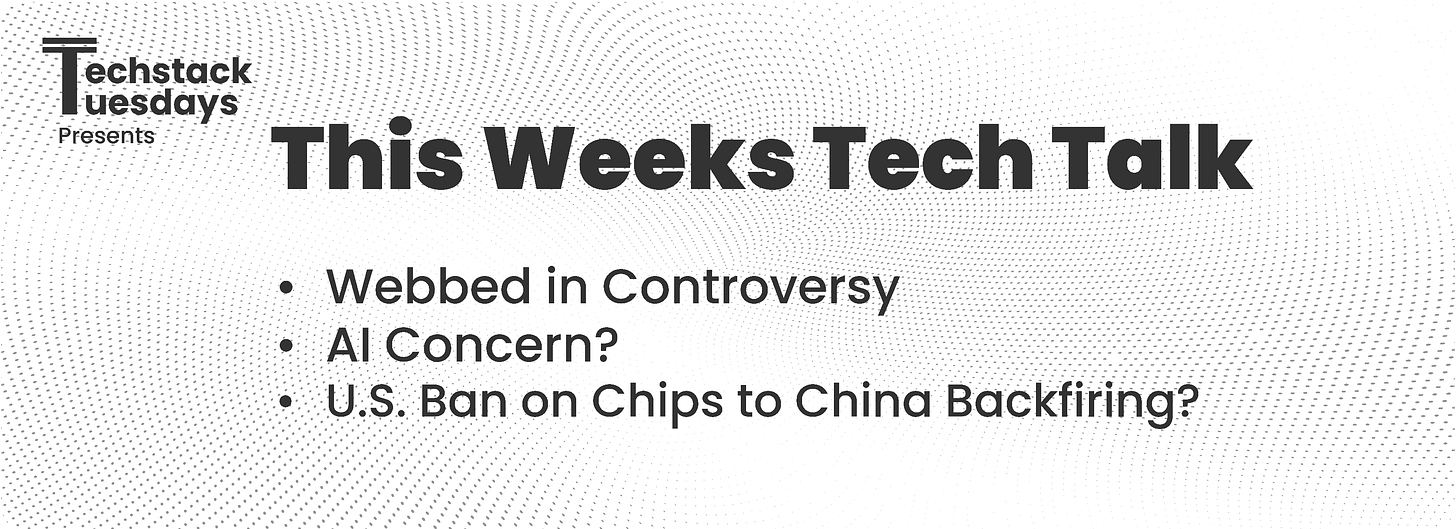Web Summit in hot water
Paddy Cosgrave seems to have caused calamity for Web Summit. Executives seem to have cybersecurity concerns around AI and the U.S's ban on chips to China might backfire?
Webbed in Controversy
Google, Meta Platforms, Intel Corp., and Siemens AG are among a growing number of companies and investors opting out of the Web Summit technology conference in Lisbon, following controversial remarks about Israel by the event's head, Paddy Cosgrave. His comments on social media criticised Western backing for Israel after the Hamas attacks, asserting, "War crimes are war crimes even when committed by allies." Although Cosgrave subsequently issued an apology recognising the impact of his words, it didn't prevent a cascade of withdrawals.
A consortium of Israeli investors has also called for a boycott. Stripe Inc., a consistent sponsor of Web Summit, announced their withdrawal, with key figures like Chief Product Officer Will Gaybrick and Chief Marketing Officer Jeff Titterton cancelling their previously planned participation. Meanwhile, the attendance of some political figures like Portuguese Economy Minister Antonio Costa Silva is still confirmed, but Germany, with Vice Chancellor Robert Habeck as a slated keynote speaker, is reconsidering its participation. Amazon, also listed as a participant, has yet to comment on its stance.
AI Concern?
A recent PwC report has illuminated the contrasting sentiments business leaders harbour towards generative AI. Many global and Irish business executives view this advanced technology as a potential threat to the cybersecurity environment. More than half of the surveyed leaders anticipate that generative AI could instigate severe cyberattacks in the forthcoming year. This sentiment echoes among 3,876 business and tech leaders, including nearly 50 from Ireland. However, there's a striking knowledge gap; only 45% of Irish respondents felt confident about understanding the cybersecurity risks linked to generative AI, while 58% of the global participants shared this sentiment. Leonard McAuliffe, a partner at PwC Ireland Cyber Practice, underscores the pressing need for business heads to evolve swiftly with the evolving tech landscape, urging them to embed security inherently within their organisations.
On the flip side, there's an emergent trend of businesses wanting to harness the power of generative AI to fortify their cybersecurity infrastructure. Globally, a significant 70% of business leaders are leaning towards this adoption, though in Ireland, the figure stands at 58%. McAuliffe recommends a judicious approach to integrating GenAI in cybersecurity endeavours, emphasising the indispensable role of human oversight and intervention. As we ushered in 2023, the cybersecurity realm braced for a seismic shift with AI anticipated to play a pivotal role. Catherine Williams, a BT threat intelligence specialist, aptly highlighted the paradox of AI in cybersecurity, labelling it a "double-edged sword," witnessing deployment by both cyber adversaries and defenders.
U.S. Ban on Chips to China Backfiring?
A recent decision by the U.S. Department of Commerce to ban the export of specific advanced artificial intelligence chips to China has been perceived as encouraging by some within the Chinese semiconductor industry. Chloe Wang, partner and vice-president at Guangzhou's Yang Cheng Fund, expressed that the move, which restricts the export of Nvidia's A800 and H800 chips, might serve as a catalyst to bolster China's domestic chip ecosystem. While Nvidia's H100 chip had been previously banned, the new restrictions are motivated by concerns that these advanced chips could be channelled for military applications. Wang, whose fund has stakes in semiconductor firms, including AI training and autonomous vehicle companies, believes that domestic chipmakers could emerge as leaders and foster their unique ecosystems in China. Highlighting the ambitious plans of the nation, Wang mentioned the objective set by various Chinese ministries to enhance the country's computing prowess by 50% come 2025, emphasising the role of advanced semiconductors in AI data processing.
Simultaneously, there are ongoing discussions about China's tech behemoth, Huawei. Notably, its latest smartphone model, the Mate 60 Pro, features a chip supporting 5G. This has caught attention, given the U.S. sanctions intended to sever Huawei from this technology. Produced by China's SMIC, the chip has raised eyebrows in Washington, leading to questions about its creation process and efficiency, especially in the context of a potential resurgence for Huawei.
That’s it for this week’s issue, If you liked it and haven’t already subscribed you can do so below! Thank you!







